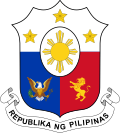| | ||||||||||||||||||||||||||||||||||||||||||||||||||
| ||||||||||||||||||||||||||||||||||||||||||||||||||
200 (of the 216) seats in the House of Representatives of the Philippines 101 seats needed for a majority | ||||||||||||||||||||||||||||||||||||||||||||||||||
This lists parties that won seats. See the complete results below.
| ||||||||||||||||||||||||||||||||||||||||||||||||||
 |
|---|
Elections for the House of Representatives of the Philippines were held on May 11, 1992. Held on the same day as the presidential election since incumbent president Corazon Aquino did not contest the election, the Laban ng Demokratikong Pilipino (LDP) served as the de facto administration party; just as all House of Representative elections, the perceived party of the president won majority of the seats in the House of Representatives. However, Fidel V. Ramos of Lakas–NUCD won the presidential election; this caused most of the newly elected congressmen to abandon the LDP for Lakas-NUCD. [1]
Contents
The elected representatives served in the 9th Congress from 1992 to 1995.
